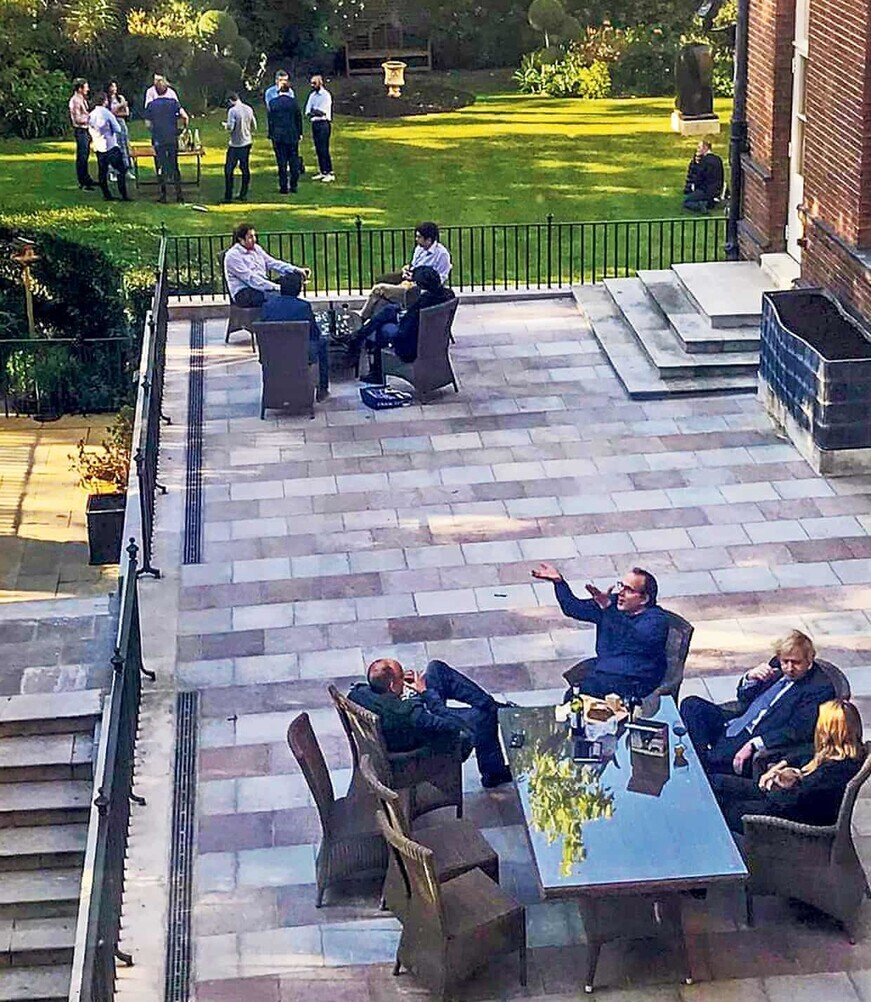hankyoreh
Links to other country sites 다른 나라 사이트 링크
[Column] Parties in the UK: What COVID-19 rule-breaking tells us about our elites


To whom do rules apply? This question has developed new explosiveness during the pandemic, which has required extraordinary sacrifices from people. Novak Djokovic learned this the hard way. Australians were infuriated when the unvaccinated tennis superstar was given an exemption to enter their country. Britons were also infuriated when newspapers reported a 2020 Christmas party with alcohol and games held at Downing Street — the official residence and office of the British prime minister, currently the Conservative Boris Johnson. Strict social distancing rules were in place at that time, which prevented many people from seeing their families for Christmas.
At first, Downing Street vehemently denied any breaking of COVID-19 rules, but the emergence of further evidence undermined this short-sighted strategy. We learned about more parties and boozy gatherings in government. The then also “infuriated” prime minister asked the Cabinet secretary — the most senior civil servant in government — to investigate the claims, and Johnson promised consequences for any rule-breaking. But it was not long before the secretary had to recuse himself from the inquiry because of reports of a party in his office, too. Public confidence started to erode, but the government still hoped the inquiry would calm the situation.
This did not work. We now know Johnson himself, together with his wife, attended at the height of the pandemic a garden party at Downing Street to which more than 100 staffers were invited by the prime minister’s principal private secretary, who wrote in plain English, “bring your own booze.” However, Johnson believed, apparently, he was attending a “work meeting,” rather than a “party.” It was also suggested that the garden at Downing Street could be considered a “workplace,” not just a garden. The public is not fooled by linguistic acrobatics to save one’s skin — it is a party, not “work” when you invite people into a sunny garden to have drinks.
The list of confirmed and alleged social gatherings and parties is getting longer and longer. An opposition member of parliament joked it might be faster to investigate the days without any parties. The picture that emerges is clear: COVID-19 rules were not observed by those who created them. When people were “locked” into their homes to prevent the spreading of the virus, when they were not allowed to see their loved ones — not even in their last hours — boozy parties took place in government, including on the eve of the funeral of the queen’s husband.
Two-thirds of the British population believe the prime minister should resign, and 8 in 10 think he was not honest about the parties. Not only the opposition but also an increasing number of senior Conservatives are demanding Johnson’s resignation. Rule-breaking and lying to parliament under-mined his authority. And he is no longer the election-winning machine that allowed his rise despite his many well-known flaws. The Labour Party opposition is 10 percentage points ahead of the Conservatives — prompting panic on the government’s backbenches.
It is difficult to see how the Johnson premiership is not approaching its end, but it should not stop there. The stories of Johnson and Djokovic — and also the corruption and “money sleaze” I’ve written about before — point to deeper problems. They remind us that many elites believe that different rules apply to them. Who is then surprised when ordinary people turn away from established institutions, turn to populist movements, turn to “misinformation”? The widespread social dis-embeddedness of elites is depressing, and too often they get away with it.
But it is encouraging when misconduct has consequences, when the public is not fooled, when accountability mechanisms do work. And we also need to remember when politicians or sports superstars lead by example, like the Manchester United striker Marcus Rashford campaigning to end child food poverty — a social crisis exacerbated by the pandemic. It is not all gloomy, but we need to remain on the watch.
Please direct questions or comments to [english@hani.co.kr]

Editorial・opinion
![[Column] Season 2 of special prosecutor probe may be coming to Korea soon [Column] Season 2 of special prosecutor probe may be coming to Korea soon](https://flexible.img.hani.co.kr/flexible/normal/500/300/imgdb/original/2024/0426/3317141030699447.jpg) [Column] Season 2 of special prosecutor probe may be coming to Korea soon
[Column] Season 2 of special prosecutor probe may be coming to Korea soon![[Column] Park Geun-hye déjà vu in Yoon Suk-yeol [Column] Park Geun-hye déjà vu in Yoon Suk-yeol](https://flexible.img.hani.co.kr/flexible/normal/500/300/imgdb/original/2024/0424/651713945113788.jpg) [Column] Park Geun-hye déjà vu in Yoon Suk-yeol
[Column] Park Geun-hye déjà vu in Yoon Suk-yeol- [Editorial] New weight of N. Korea’s nuclear threats makes dialogue all the more urgent
- [Guest essay] The real reason Korea’s new right wants to dub Rhee a founding father
- [Column] ‘Choson’: Is it time we start referring to N. Korea in its own terms?
- [Editorial] Japan’s rewriting of history with Korea has gone too far
- [Column] The president’s questionable capacity for dialogue
- [Column] Are chaebol firms just pizza pies for families to divvy up as they please?
- [Column] Has Korea, too, crossed the Rubicon on China?
- [Correspondent’s column] In Japan’s alliance with US, echoes of its past alliances with UK
Most viewed articles
- 1‘We must say no’: Seoul defense chief on Korean, USFK involvement in hypothetical Taiwan crisis
- 2AI is catching up with humans at a ‘shocking’ rate
- 3Is Japan about to snatch control of Line messenger from Korea’s Naver?
- 4Division commander ordered troops to enter raging flood waters before Marine died, survivor says
- 5[Column] Season 2 of special prosecutor probe may be coming to Korea soon
- 6Is N. Korea threatening to test nukes in response to possible new US-led sanctions body?
- 7[Guest essay] The real reason Korea’s new right wants to dub Rhee a founding father
- 8Korea sees more deaths than births for 52nd consecutive month in February
- 9[Editorial] Korea’s surprise Q1 growth requires objective assessment, not blind fanfare
- 10One Hyundai worker suffers through 16 piecemeal contracts in 23 months